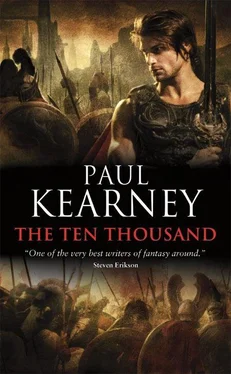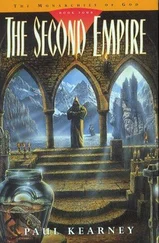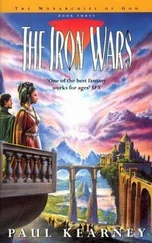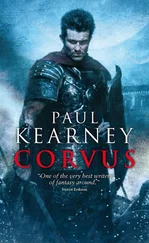Paul Kearney - The ten thousand
Здесь есть возможность читать онлайн «Paul Kearney - The ten thousand» весь текст электронной книги совершенно бесплатно (целиком полную версию без сокращений). В некоторых случаях можно слушать аудио, скачать через торрент в формате fb2 и присутствует краткое содержание. Жанр: Фэнтези, на английском языке. Описание произведения, (предисловие) а так же отзывы посетителей доступны на портале библиотеки ЛибКат.
- Название:The ten thousand
- Автор:
- Жанр:
- Год:неизвестен
- ISBN:нет данных
- Рейтинг книги:5 / 5. Голосов: 1
-
Избранное:Добавить в избранное
- Отзывы:
-
Ваша оценка:
- 100
- 1
- 2
- 3
- 4
- 5
The ten thousand: краткое содержание, описание и аннотация
Предлагаем к чтению аннотацию, описание, краткое содержание или предисловие (зависит от того, что написал сам автор книги «The ten thousand»). Если вы не нашли необходимую информацию о книге — напишите в комментариях, мы постараемся отыскать её.
The ten thousand — читать онлайн бесплатно полную книгу (весь текст) целиком
Ниже представлен текст книги, разбитый по страницам. Система сохранения места последней прочитанной страницы, позволяет с удобством читать онлайн бесплатно книгу «The ten thousand», без необходимости каждый раз заново искать на чём Вы остановились. Поставьте закладку, и сможете в любой момент перейти на страницу, на которой закончили чтение.
Интервал:
Закладка:
When morning came he found that two of the urchin-children had wormed under his cloak in the night and were spliced to him like wasps to a honeycomb. In the warmth under the cloak all his vermin and theirs had come alive, and he itched damnably. Even so, he was reluctant to rise, for the cloak and the ground around it had a light skiff of snow upon it that had frozen hard, and the sunrise just topping the mountains had kindled from it a hundred million jagged points of rose-coloured light. Even the log-butts from the fire had frost on them. When Gasca blinked, he could feel his eyebrows crackle.
The children squealed as he threw aside the cloak and rose to his feet, stamping his sandals into the stone-hard ground and stretching his limbs to the mountains. He strode out to the roadside and pissed there, standing in an acrid cloud of his own making and blinking the sleep out of his eyes. Looking up and down, he saw the road was empty in both directions. To the south it disappeared between the shoulders of two steep white hills, on one of which there loomed the rocky ruins of a city. That was Memnos. They had hoped to see it this morning when they woke. Machran now lay a mere thirty pasangs away, an easy day’s march. Tonight they would sleep under a roof, those who could afford it. Gasca had promised himself a good meal, and wine worthy of the name. He spat the taste of last night’s out onto the road, grimacing.
Something moved in the treeline. The original builders of the road had hewn back the woods on either side for a bowshot, and though those who maintained it now had not done so well, there were still a good hundred paces of open ground before the tangled scrub and dwarf-pine of the thickets began. In the dawn-light Gasca’s piss-stream dried up as he saw the pale blur of a face move in there. He turned at once and dashed back to the campsite, booting aside one of the yawning urchins. His spear was slick with frost and he cursed as it slipped in his fingers.
By the time he had turned back to the woods the figure was visible. A man walking towards the road with his arms held out from his sides, and in one fist a single-headed spear. The man thrust this point-first into the ground for lack of a sauroter, and then came on with both palms open in the universal gesture. I mean no harm. Gasca’s breathing steadied. He strode forward. Others from the company were blinking their way out of their bedrolls, throwing aside furs and trying to make sense of the morning. One of the younger children was crying hopelessly, blue with cold.
Gasca stood between the approaching figure and the waking camp, and planted the sauroter of his own spear in the roadside. He wished now he had clapped on his father’s helm.
“What’s your business? State it quickly. I have good men at my back,” he said loudly, hoping those good men were out of their blankets. He scanned the treeline, but nothing else moved there. For the moment, at least, this fellow was alone. But that meant nothing. He might have twenty comrades stowed back in the trees, waiting to see the company’s headcount.
The man was tall, as tall as Gasca, though nothing like as broad. In fact he had a gaunt, hungry look. His chiton was worn and stained, ripped open at the neck in the grief-mark, and he had a blanket slung bagwise about his torso. There was a knife at his waist, hanging from a string. A scar marred the middle of his lower lip.
“I mean no harm. I hoped to share your fire,” the man said.
The two merchants and the young husbands joined Gasca at the roadside, wielding clubs and knives. “Shall we kill him?” one of the husbands asked eagerly.
“He’s not robbed us yet. Let him speak,” Gasca said.
He was young, this fellow. Now that they all had a chance to see him up close they realised that he was not much more than an overgrown boy. Until one looked in his eyes. He stared at Gasca, and in his hooded gaze there was utter indifference.
I could kill him right here and now, Gasca thought, and he would not raise so much as a finger.
“What’s your name?” he asked, more gently than he had meant to.
“Rictus.”
“Of what city?”
The thin man hesitated. “I was of Isca,” he said at last, “When Isca still stood.” His eyes hardened. “I seek only to travel with you to Machran. I have no ill intent. And I am alone.” He raised his hands, empty.
“Come on to the fire,” Gasca said. “If we can raise a flame.”
“Isca?” one of the merchants said. “What happened to Isca?”
The man named Rictus turned his head. He had eyes like grey shards of iron, cold as the sea. “Isca is no more.”
“Really? Gods above. Come, boy-come sit and tell us more.”
The strangeness had been broken. A threatening shape walking out of the woods had become a tired young man, who spoke civilly. They gathered around him, glad perhaps of some new story; news that was not shopworn, but fresh and raw. Gasca drew away, still watching this gaunt apparition. The man Rictus did not move. Something flickered in his eyes; pain. He was regretting this already, Gasca realised. He spoke again. “Let me go back for my spear.”
They tensed. He looked at Gasca.
“Go get it,” Gasca said, and shrugged.
Some humanity in the eyes at last. The man nodded, and went back the way he had come.
“You think he’s not a ruse, a roadsman?” one of the young husbands asked.
Gasca was about to answer, but it was the fat merchant who spoke first.
“Look in his face-he tells the truth. I’ve seen eyes like that before.” The merchant’s face tightened. For a second it was possible to see the soldier he might have been in younger days.
“We’ve nothing to fear from this lad. He’s already made his gift to the goddess.”
They got the fire going again, digging out of its black carcass a single red mote of living heat. This they conjured into a blaze, and with the addition of copper cauldrons they had boiling water soon after, and set the barley to swell in it. The campsite regained some of its usual cheer, though the newcomer, Rictus, had an armspan of cold air between himself and the rest. This was remedied when one of the urchins edged close, and finally sat defiantly within the crook of his arm. Rictus appeared startled, then pleased, then grim as a blacksmith’s washbowl. By his posture, one might think he had a spear-staff for a spine. And he was so cold that the warmth of the child next to him finally set him to shivering, with ground teeth.
The fatter of the merchants, the one Gasca now knew to be a true man, threw the wineskin to Rictus.
“Drink, for the gods, for all of us. Have a drink, lad. Pour a libation if you will. Ease that look in your eyes.”
Rictus took the skin and drank. He drank as though it were the last thing he would ever do. And while his cheeks were still puffed full of wine, he poured a stream of it from the mouth of the skin so that it might puddle on the ground.
“That’s good wine-” the thinner merchant cried.
“Shut your mouth,” the fatter one told him, and Gasca nodded when he met his eyes. There were proprieties. There was decency. A man could not weigh the price of all things, and yet ignore their value.
Teeth bared for a moment against the vileness of the wine, Rictus looked at Gasca, and jerked his head towards the thickets on the western margins of the road. “Back in there, maybe two pasangs, or one and a half, there are eight men about a dead campfire arguing over the best time to ambush you.”
Silence about their own fire. The procuress asked, “And they’re friends of yours, are they?”
“If they were, would I be here?”
The fat merchant rubbed his fingertips through his beard. “Eight you say? Why did they not attack us before now? Dawn and dusk are the best time for these things.”
Читать дальшеИнтервал:
Закладка:
Похожие книги на «The ten thousand»
Представляем Вашему вниманию похожие книги на «The ten thousand» списком для выбора. Мы отобрали схожую по названию и смыслу литературу в надежде предоставить читателям больше вариантов отыскать новые, интересные, ещё непрочитанные произведения.
Обсуждение, отзывы о книге «The ten thousand» и просто собственные мнения читателей. Оставьте ваши комментарии, напишите, что Вы думаете о произведении, его смысле или главных героях. Укажите что конкретно понравилось, а что нет, и почему Вы так считаете.












